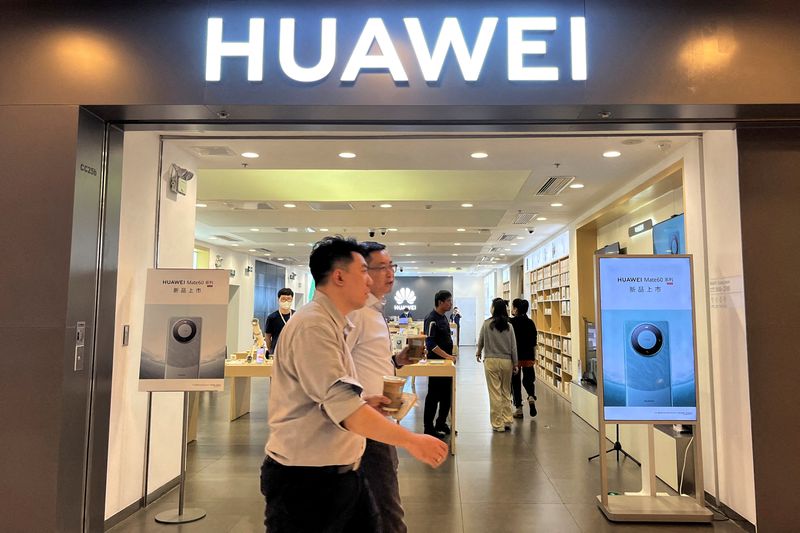By Fanny Potkin and Julie Zhu
SINGAPORE/HONG KONG (Reuters) - Soaring appetite for Huawei's artificial intelligence (AI) chips coupled with manufacturing constraints has forced the Chinese tech giant to prioritise AI and slow production for its premium Mate 60 phones, people familiar with the matter said.
Huawei uses one facility producing both its Ascend AI chips and the Kirin chips that power its rival to Apple (NASDAQ:AAPL)'s iPhone, three people said, two of whom said output has been hamstrung by a low yield rate - a proxy for production quality.
But a global race for AI functionality amid a Sino-U.S. technological standoff has left Huawei second-placing its handsets just as the firm tops Chinese smartphone sales for the first time in more than three years.
Huawei declined to comment.
The situation offers a rare glimpse of Huawei's challenges as it works to rebuild since U.S. sanctions in 2019 cut access to advanced chipmaking tools on national security grounds and crippled its smartphone unit. Huawei denies it is a security risk.
It also illustrates the impact of U.S. restrictions on sales of AI processing chips to China, a market that was 90% controlled by U.S. giant Nvidia before the latest curbs in October pushed Chinese customers to domestic alternatives.
The government has launched an initiative to improve China's position in computing power. That has spurred local authorities to announce data centre projects while bolstering public and private demand for Huawei's Ascend series in particular, according to two of the people and public tenders.
The Ascend 910B is widely considered the most competitive non-Nvidia AI chip available in China.
Huawei has prioritised production of Ascend chips over Kirin chips and so has slowed manufacturing for Mate 60 smartphones, the people said, without disclosing when the arrangement began.
The firm is also working to improve its yield rate - the number of usable chips per wafer - so is hoping this production arrangement is short term, the people said, declining to be identified as they were not authorised to speak with media.
LOW KEY
Huawei has been low-key on its chip manufacturing capability and ambition, and there is little public information on its progress or how it has managed to produce advanced chips.
Its advancements became apparent after it surprised market watchers with an unflagged August launch of the Mate 60 series during U.S. Commerce Secretary Gina Raimondo's visit to China.
Online tear-downs found the phones to possess a Chinese-made chip capable of fifth-generation (5G) telecommunication speeds. Analysts said Huawei may have been able to achieve this together with know-how from China's largest contract chipmaker, SMIC, by tweaking deep ultraviolet lithography machines.
Such a process is more laborious, expensive and likely less productive than using the more advanced extreme ultraviolet machines that the United States has prevented third countries from selling to China, analysts said.
Mate 60 handsets have been consistently out of stock, with would-be buyers complaining online of month-long waiting times for pre-orders to be fulfilled.
Even so, the series was largely responsible for Huawei regaining its status as China's top smartphone seller in the first two weeks of 2024, said data provider Counterpoint - the first time since the end of 2020.

Other Huawei products affected by the production bottleneck include Ascend-equipped computing unit MDC 810, which powers advanced driver assistance systems, two other sources said.
Chinese automakers had to delay delivery of flagship models due to production issues with the MDC 810, Reuters reported last week.